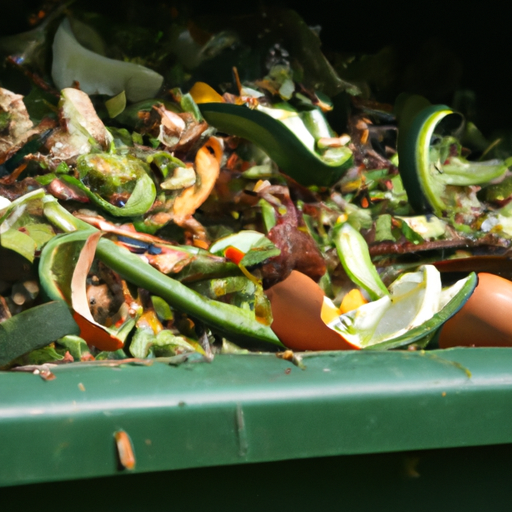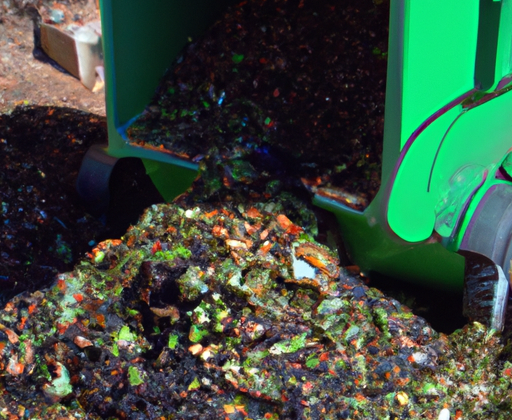Composting: Let’s Talk Compost Machines
Hey, folks! It’s great to be here to talk to you about composting and, specifically, compost machines. Composting is an environmentally friendly way to create nutrient-rich soil from organic materials that would otherwise go to waste. It’s an easy way to reduce our carbon footprint and promote sustainable living. In this blog post, we’ll discuss what compost machines are, how they work, and if there’s a machine that turns compost into dirt. So, sit back, relax, and let’s dive in!
What the Heck is a Compost Machine?
Okay, let’s break it down. A compost machine is basically a device that speeds up the natural process of composting. It takes organic waste materials (like food scraps and yard trimmings), processes them, and turns them into nutrient-rich compost that can be used to improve soil quality in gardens and farms.
But why use a compost machine instead of just letting nature do its thing? Well, for one thing, compost machines can produce compost much faster than traditional compost methods. Instead of waiting months or even years for your compost pile to decompose, a compost machine can turn your waste into usable compost in a matter of weeks. Plus, compost machines are much more efficient at breaking down materials than traditional composting methods, meaning you can compost a wider range of materials and get higher quality compost.
How da heck does a Compost Machine work?
Okay, y’all, let’s get into how these compost machines actually work. The process can vary depending on the specific machine, but I’ll give y’all a general step-by-step breakdown.
First things first, you gotta load up the machine with organic materials like food scraps, yard waste, and maybe even some paper products. Then you can add in some compost activators like water and microorganisms to get the process started.
Next comes the mixing and turning stage. Some machines have a built-in system that takes care of this for you, while others require you to manually turn the materials yourself. The mixing and turning helps break down the organic material and speeds up the composting process.

After the mixing stage, the compost machine will usually heat up and begin to break down the material even further. This can often take a few weeks to a few months, depending on the machine and the materials being processed.
Finally, you’ll end up with a finished compost that can be used as a soil amendment or fertilizer. Some machines even have a built-in system that separates any leftover debris from the finished compost, giving you a clean and ready-to-use product.
Overall, these compost machines can make the composting process much easier and faster than traditional methods. Plus, they’re often designed to be easy to use and maintain, making them a great option for folks who want to compost but don’t have a ton of time or space.
Looking for a Compost Machine that Turns it into Dirt? Let’s Talk
So, you’re interested in composting but you want to fast-track the process and get some nutrient-rich dirt quickly. Is there a compost machine that can help you with that?
First of all, let’s define what “turning it into dirt” means. Composting is the process of breaking down organic material into a soil-like substance called compost. However, this compost is not yet considered “dirt” as it needs more time to fully mature and break down into a homogeneous substance.
Now, let’s get to the question at hand. Yes, there are compost machines that can help speed up the process of turning organic material into compost and eventually into dirt.
One possible solution is a vermicomposting system that uses worms to help break down the organic material. These systems are often small and can be used indoors, making them great for apartment dwellers or those with limited outdoor space. The resulting worm castings, or vermicompost, can be added to soil to enhance its nutrient content and improve plant growth.
Another option is a compost tumbler that uses an aeration system to help break down organic material quickly. These machines can turn organic material into usable compost in as little as three weeks, but they can be pricey and may not be as efficient as other composting methods in terms of volume.
Keep in mind that while a compost machine can speed up the composting process, it should not be considered a shortcut. Composting still requires proper ratios of carbon and nitrogen-rich materials, regular turning or agitation, and proper moisture levels for efficient decomposition.
In conclusion, there are compost machines out there that can help speed up the process of turning organic material into compost and eventually into dirt. However, it’s important to do your research and choose a machine that fits your specific needs and composting goals.
That’s a Wrap: The Lowdown on Compost Machines
Well folks, there you have it – everything you need to know about compost machines at your fingertips! To sum it up, compost machines are devices that help you turn organic waste into nutrient-rich compost for your garden. They are efficient, easy to use, and come in a variety of sizes and types.
If you’re thinking about getting a compost machine, I highly recommend it. Not only will it reduce your carbon footprint and divert organic waste from landfills, but it will also save you money on fertilizers and improve the health of your plants! Plus, it’s a fantastic way to teach your children about sustainability and the natural cycle of life.
Before you purchase a compost machine, do your research and figure out what type will best suit your needs. Consider factors such as how much waste you produce, what material the machine can process, and where you will keep it. And don’t forget to maintain your machine properly to avoid any unpleasant odors!
All in all, composting is an excellent way to take an active role in reducing waste and creating a healthier planet. With a compost machine, you can do your part and reap the benefits of beautiful, thriving gardens. Happy composting!
FAQs About Composting Machines
Does a composter make dirt?
Well, let me tell you something, friend: a composter does not necessarily produce dirt, per se. It churns organic waste and, in the end, can produce a substance called compost. Now, compost is quite similar to dirt, but it’s not technically the same thing. Compost is a nutrient-rich material that can help plants grow better and help balance the pH level of your soil. It’s important to note that not all composting machines are created equal. Some produce higher-quality compost than others, depending on factors like the temperature, moisture, and the types of organic materials you put in the composter. So, if you’re looking to create dirt specifically, you might need to do some additional work beyond using a basic composter. However, if your goal is to improve your soil and give your plants a boost, compost can absolutely help you out with that.
So, my advice to you is to do your research and carefully choose the right composting machine for your needs. Look for one that evenly mixes your organic material, and where you can easily regulate the temperature and moisture. Also, be sure to turn the compost regularly to allow for proper aeration. Lastly, if you have any specific questions or concerns, it’s always a great idea to consult with a gardening expert in your area. Happy composting!
What machine turns food waste to dirt?
Well, let me tell ya, there are actually a few different types of machines out there that can turn food waste into a nutrient-rich soil amendment. One popular option is the compost tumbler, which is essentially a drum that you can load up with your compostables and then turn on a regular basis to help speed up the decomposition process. Another option is the worm composting system, also known as vermicomposting, which involves feeding your food scraps to a bunch of hungry worms who will happily chow down and produce a high-quality compost in the process. And if you’re looking for something on a larger scale, you might want to consider a commercial composting machine, which can handle much larger quantities of waste and turn it into finished compost in a matter of weeks. So, whether you’re composting at home or in an industrial setting, there are definitely machines out there that can help you turn your food waste into dirt!
How do you turn compost into soil?
I ain’t no compost expert, but I can tell ya that there’s no machine that turns it into dirt instantly. It’s all about time and patience. You see, composting is a natural process where microorganisms break down organic matter into a nutrient-rich soil amendment. To speed it up, you need to maintain the right conditions for these microorganisms to thrive. First things first, you need a compost pile or bin. The bigger, the better, but make sure it’s not too big for you to manage. You want a good mix of nitrogen-rich green materials (like kitchen scraps and lawn clippings) and carbon-rich brown materials (like leaves and twigs). Add them in layers, keeping the pile moist but not soaking wet. Turn it every week or so to aerate it and mix the materials. The thing about composting is that it’s not an exact science. There’s no magic formula or recipe that guarantees success. It depends on factors like temperature, moisture, oxygen, and the types of microorganisms present. Some experts recommend adding things like bone meal, blood meal, or compost accelerators to speed up the process, but others argue that they’re unnecessary or even harmful. Ultimately, you’ll know your compost is ready when it looks and smells like dark, crumbly soil. Depending on the conditions and materials, this can take anywhere from a few months to a year. You can use a compost thermometer, if you’re feeling fancy, to check the temperature. It should reach 140-160°F in the first few days, then gradually cool down to ambient temperature. Once you have your compost, you can mix it with other soil or use it as a top dressing for your garden beds. It’s full of beneficial microbes, nutrients, and organic matter that help feed your plants and improve soil structure. And the best part is, you made it yourself from waste that would’ve gone to a landfill. Ain’t that cool?

